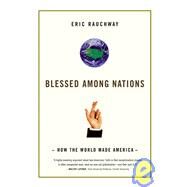Blessed Among Nations How the World Made America
, by Rauchway, Eric- ISBN: 9780809030477 | 0809030470
- Cover: Paperback
- Copyright: 6/26/2007
Nineteenth-century globalization made America exceptional. On the back of European money and immigration, America became an empire with considerable skill at conquest but little experience administering other people's, or its own, affairs, which it preferred to leave to the energies of private enterprise. The nation's resulting state institutions and traditions left America immune to the trends of national development and ever after unable to persuade other peoples to follow its example. In this concise, argumentative book, Eric Rauchway traces how, from the mid-1800s to the early 1900s, the world allowed the United States to become unique and the consequent dangers we face to this very day. Eric Rauchwayhas written for theFinancial Timesand theLos Angeles Times. He teaches at the University of California, Davis, and is the author ofMurdering McKinley:The Making ofTheodore Roosevelt's America. He lives in northern California. In a mere fifty years, the United States transformed itself from a second-tier country crippled by its effort to abolish the appalling institution of human slavery into a great power unlike any the world had ever seen. The question of how it did this should command our attention all by itself, but the question of why it became such a peculiarand incompetentempire surely ranks as one of the great questions of modern history. For truly, measured by consequences, few global disasters can match the mismanagement of the international system in the 1920s, which owed almost entirely to bad decisions made in America. All that saves the United States from complete responsibility is the answer to the first question, of how this change happened so fast: America became a great power so swiftly, and became such a peculiar empire, because the rest of the world made it that way. Globalization does not always level the world's playing field. It produces winners, losers, and, on occasion, global economic disasters. As Eric Rauchway compellingly shows, no nation more clearly reflects the effects of globalization's uneven influence than the United States. A historian's answer to the rosier predictions of economists,Blessed Among Nationsis a narrated reminder that we need merely to review the decades between the end of the Civil War and the aftermath of World War Ithe first era of globalizationto realize that one nation's enrichment need not benefit the whole world. An incisive explanation of why America has inspired more envy than imitation,Blessed Among Nationswarns that if we do not better understand how the United States failed, early on, to master the forces that made it what it is today, we stand to make the same mistakes again, in a world with even higher stakes. "I can always depend on Eric Rauchway to display the meticulousness of a careful historian with the literary flair of a fine novelist.Blessed Among Nations:How the World Made Americaadds to this admixture a powerful public voice as well. A tour de force."Eric Alterman, author ofWhen Presidents Lie:A History of Official Deception and Its Consequences"The opening chapter ofBlessed Among Nationsnotes how much the United States differed from other industrial and industrializing nations between 1850 and 1920. The book;s main theme is that despite its unique character, the United States benefited extraordinary from globalization . . . As a description of various aspects of American behavior and development, the book is provocative and thoroughly researched. Rauchway writes very well and unearths interesting examples to illustrate his points. As a supplemental reader, the book will stimul







